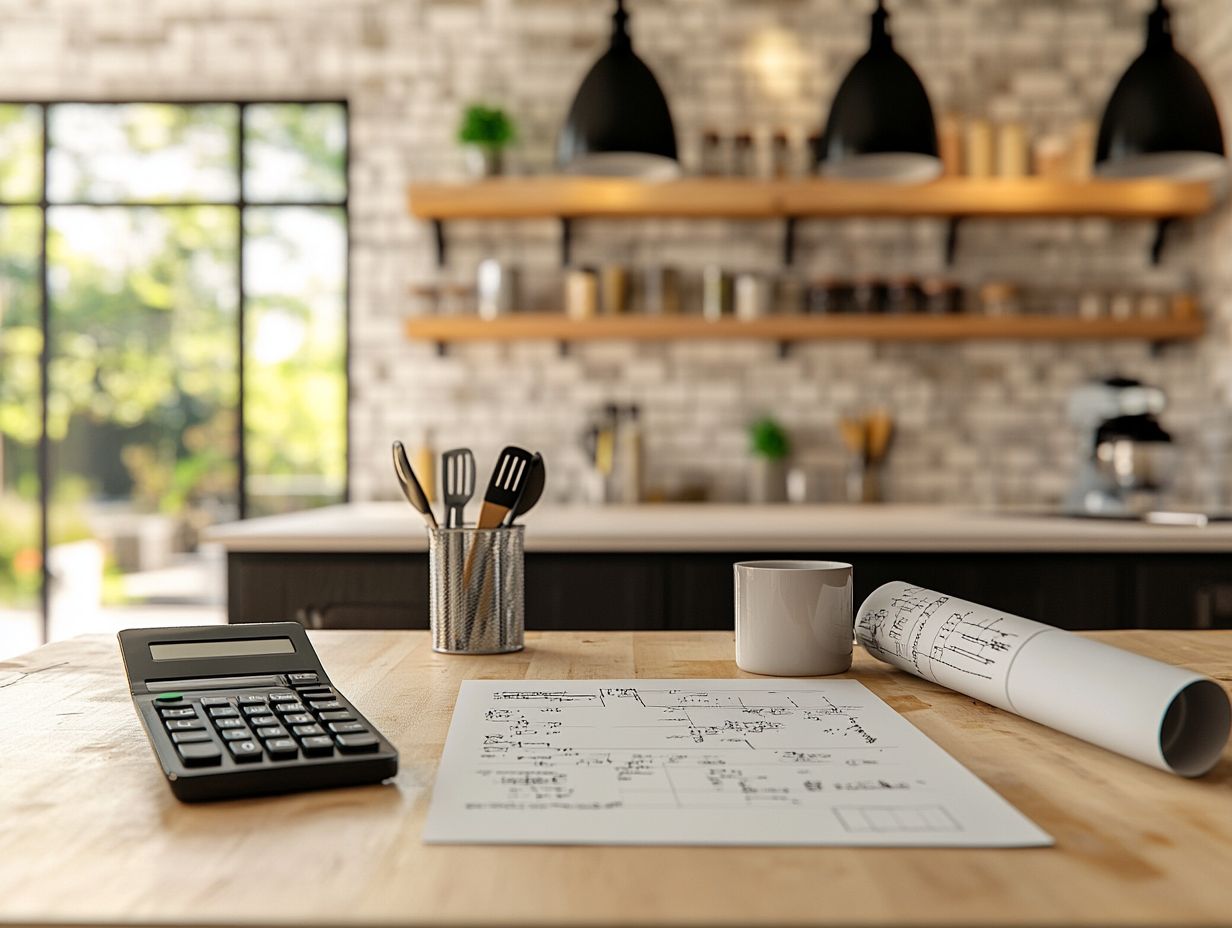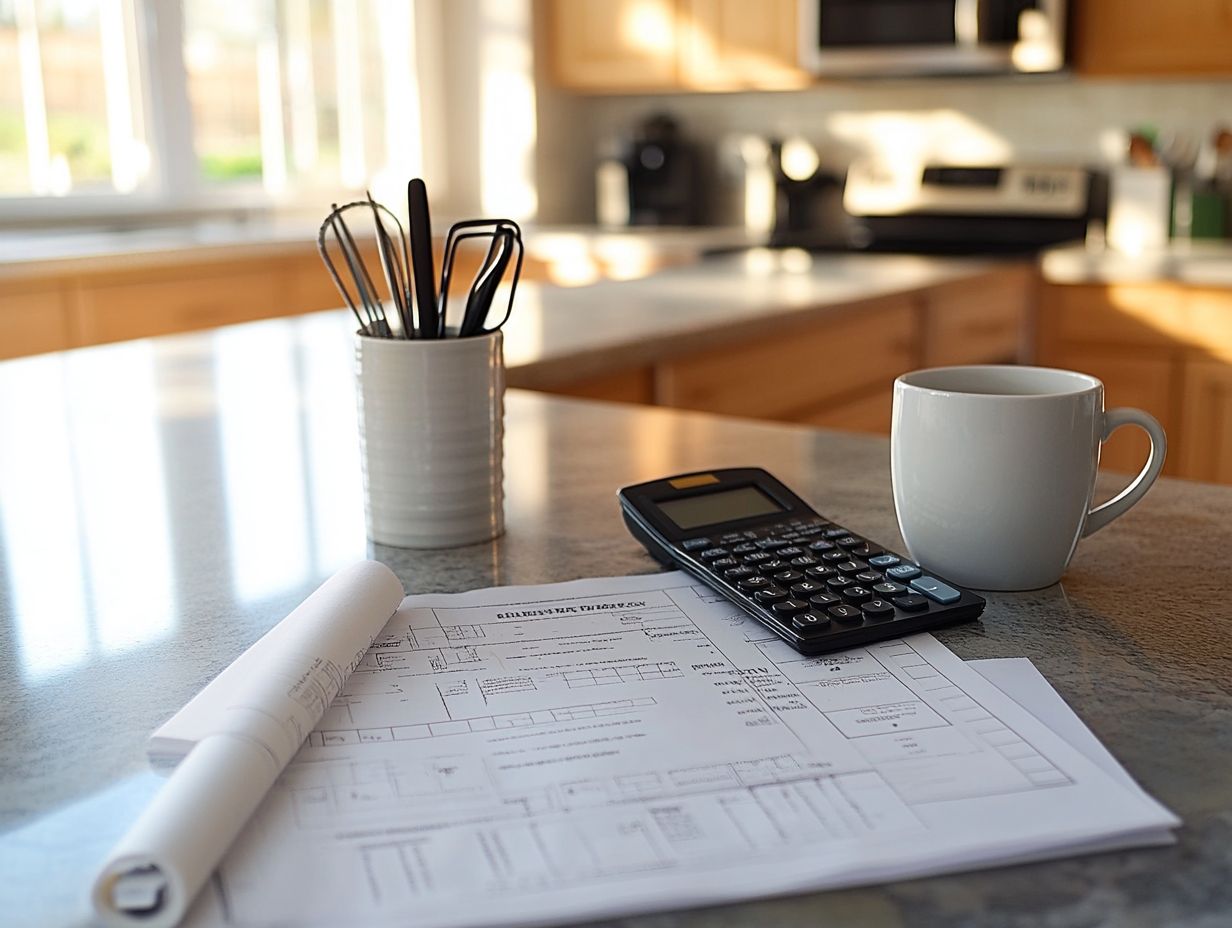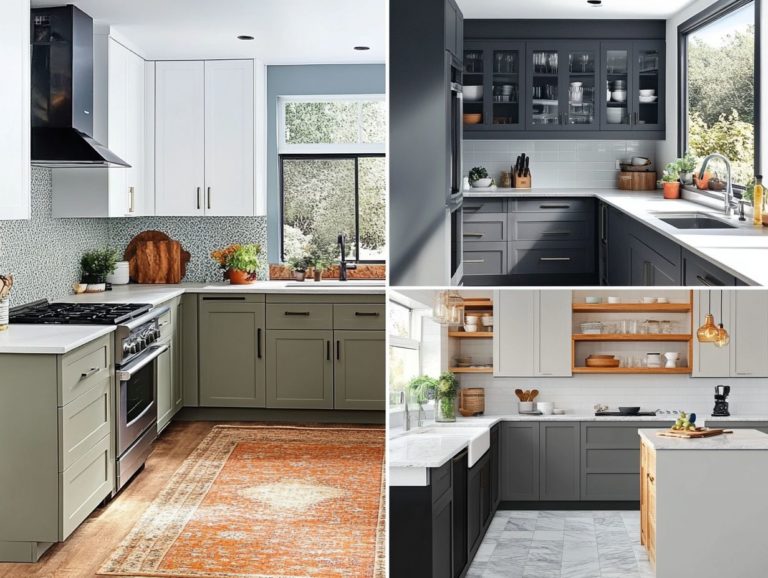Understanding the Cost of Kitchen Permits
When you’re planning a kitchen renovation or launching a food-related business, understanding kitchen permits is essential. These permits ensure that you comply with health and safety regulations, safeguarding both you and your customers.
So, what exactly are kitchen permits, and why do they matter? This article will walk you through the key aspects of kitchen permits, including their costs, the factors that influence those costs, and practical tips to navigate the often-complex permit process.
With this knowledge in hand, you’ll be ready to approach your kitchen project with unwavering confidence!
Contents
- Key Takeaways:
- Why are Kitchen Permits Required?
- Factors Affecting the Cost of Kitchen Permits
- Navigating the Permit Process
- Tips for Reducing the Cost of Kitchen Permits
- Frequently Asked Questions
- What are kitchen permits and why do I need them?
- How much do kitchen permits typically cost?
- What factors affect the cost of kitchen permits?
- Do I need permits for minor kitchen renovations?
- How can I estimate the total cost of kitchen permits for my project?
- What happens if I start my kitchen renovation without permits?
Key Takeaways:

Kitchen permits are required by local governments to ensure compliance and safety in kitchen projects.
The cost of kitchen permits can vary depending on factors such as location, type of kitchen, and project size.
You can lower kitchen permit costs by researching specific requirements and fees, and by considering ways to save money, such as obtaining multiple permits at once.
What are Kitchen Permits?
Kitchen permits are essential approvals you’ll need if you’re considering significant renovations or construction projects in your home.
This is especially true for projects involving structural changes, electrical work, or plumbing.
These permits ensure your work meets local building rules, ultimately safeguarding the safety and legality of your renovation project.
Securing a kitchen permit boosts the overall value of your property and shields you from potential legal issues or construction defects that may arise from unpermitted work.
When you plan renovations like kitchen remodeling or home additions, you must understand that permits are often mandatory.
Failing to obtain the right permits can lead to serious consequences, including fines, increased liability, or even the need to reverse completed work.
The process for applying for kitchen permits usually involves submitting detailed plans to local authorities.
They will evaluate compliance with applicable codes and safety standards, which includes necessary inspections to ensure your renovations meet the outlined regulations.
Following this path is essential for compliance and for ensuring that your renovated space is safe, functional, and legally recognized.
Why are Kitchen Permits Required?
Kitchen permits are crucial to ensure that all your construction and remodeling projects adhere to safety standards and comply with local building codes.
This not only protects you as the homeowner but also safeguards future occupants.
Without the proper permits, you risk running afoul of municipal building regulations, which could lead to costly fines and complications down the line.
Having the necessary permits can streamline the home-selling process, as potential buyers typically seek proper documentation to verify the quality and legitimacy of the construction and renovation work completed.
Importance of Compliance and Safety
Compliance with building codes is essential in any kitchen renovation, ensuring that your project meets industry safety standards.
This protects both you and your guests.
By adhering to these codes, you guarantee the structural integrity of your renovation and minimize the risk of hazards like electrical malfunctions or plumbing failures.
Securing the proper kitchen permits allows for crucial building inspections that shield you from potential issues down the line.
Navigating the maze of building codes can be complex, as they often include regulations concerning electrical systems, ventilation, and even materials used for cabinetry.
It’s easy for homeowners to overlook these requirements, which can lead to compliance issues such as inadequate wiring or improper appliance installation.
The advantages of undergoing a building inspection are substantial.
Qualified inspectors will evaluate every aspect of your renovation, ensuring that everything aligns with local codes and regulations.
This not only enhances safety but also offers peace of mind, knowing that the work completed adheres to legal standards and safeguards your investment in the heart of your home—the kitchen.
Factors Affecting the Cost of Kitchen Permits

The cost of kitchen permits can vary widely. Several factors influence this, including the complexity of your project and local fees.
Knowing the average cost range for kitchen permits is essential for homeowners. This understanding enables effective budgeting and financial planning during your renovation journey. The scope of the project, your municipality, and the nature of the work will all impact the final costs.
Location and Type of Kitchen
Your project’s location is crucial for the costs associated with kitchen permits. Different municipalities have their own regulations and fees. Urban areas often impose higher fees compared to rural ones.
Specific projects, like garage conversions or swimming pool installations, may also have unique permit costs. Familiarizing yourself with local building department policies can help you navigate the permit application process efficiently.
The type of kitchen renovation you’re planning also impacts permit requirements and costs. For example, if your renovation involves plumbing changes, such as relocating sinks or adding new gas appliances, you may need additional permits, which can lead to higher fees.
On the other hand, cosmetic updates, like new cabinetry or flooring, might not always require permits, depending on local regulations. If you’re planning a renovation, it’s crucial to check with your local building department for tailored guidance. This step ensures compliance and helps you avoid unexpected costs.
Size and Scope of Project
The size of your kitchen renovation affects permit costs significantly. Typically, larger and more intricate renovations require more extensive permits and inspections.
For instance, a comprehensive kitchen remodel that includes structural changes will incur different fees compared to a smaller project like swapping out appliances. Understanding how project size correlates with permit expenses is vital for accurately planning your renovation budget.
If you’re considering a small-scale kitchen update, like repainting cabinets, you might only need a straightforward permit, typically with minimal fees.
Conversely, substantial renovations involving plumbing fixture relocation or new electrical systems may require multiple permits, significantly escalating costs.
For example, adding a new island with a sink necessitates plumbing permits and compliance with local electrical codes for new outlets. This complexity can greatly affect your overall renovation budget, emphasizing the importance of meticulous planning.
Additional Requirements and Fees
Beyond basic permit fees, be aware of potential additional requirements that could lead to extra costs during your kitchen renovation. These may include charges for specialized inspections, fees for specific plumbing or electrical work, and administrative costs from the building department.
Understanding these additional fees is essential for accurately budgeting your entire renovation project. You may need to submit detailed site plans to illustrate your proposed changes, which could require hiring a professional, adding to your expenses.
It’s common for municipalities to mandate periodic inspections throughout the renovation, and each of those can come with its own fee. Do your research now! Knowing the rules can save you money later.
Consulting with contractors familiar with local requirements can also be beneficial. Create a comprehensive budget that includes a buffer for unexpected charges to protect yourself from financial surprises.

Navigating the permit process for kitchen renovations can feel daunting. However, understanding the essential steps can transform your experience and ensure compliance with local regulations.
Start by identifying the specific kitchen permits you need for your renovation project. Once you’ve done that, submit a permit application to the local building department. Be ready to provide detailed plans, including site plans and any structural changes involved.
With a clear understanding of these steps, you can approach the process with confidence and ease.
Steps to Obtain Kitchen Permits
To successfully obtain kitchen permits, follow several crucial steps, starting with determining the specific permits required for your renovation project.
Research local regulations and understand the types of building permits you’ll need, such as those for plumbing, electrical work, and structural changes.
After identifying the necessary permits, tackle the application process. This may require detailed site plans and preparation for any required building inspections.
Gather all relevant documentation meticulously; incomplete applications can lead to delays or rejections. Expect multiple inspections throughout your renovation, designed to ensure compliance with safety rules and quality standards.
Common pitfalls include underestimating the approval time and neglecting to consult with professionals who can help you navigate complex regulations.
Stay organized, maintain regular communication with the permitting office, and proactively address any issues that arise to keep things moving smoothly.
Tips for Reducing the Cost of Kitchen Permits
Reducing the cost of kitchen permits should be a top priority for homeowners keen on keeping renovation projects within budget.
Several strategies can lead to significant savings. Gain a thorough understanding of the permit process and local regulations. Look for opportunities for cost reduction, such as applying for the appropriate type of permit service or taking advantage of available exemptions for smaller projects.
Meticulous planning and coordination can minimize the number of required inspections, further driving down your overall costs.
Ways to Save Money on Permits
There are effective strategies to save money on kitchen permits, easing the financial strain of your home renovation projects.
First, ensure you’re fully informed about all permit fees and requirements. This knowledge allows you to avoid unnecessary expenses. Planning renovations that fall under small project categories—which may not require permits—can significantly cut costs, so understanding which elements of your kitchen remodel need a permit is essential.
Consider timing your permit applications to coincide with other construction activities. This approach minimizes downtime and helps you avoid potential delays.
Stay organized to prevent last-minute changes that could lead to additional costs. Unexpected modifications often necessitate new permits.
Engaging with qualified professionals can provide invaluable insights. They help pinpoint cost-effective strategies and streamline workflows. By doing so, you’ll navigate the complex permit landscape more effectively, ensuring your renovation remains within budget while complying with all necessary regulations.
Check out this video to learn more about navigating the kitchen permit process!
Frequently Asked Questions

What are kitchen permits and why do I need them?
Kitchen permits are essential documents issued by local government agencies that grant permission to perform construction or renovation work in your kitchen. These permits ensure the work is done according to safety regulations and rules that guarantee quality construction. Without kitchen permits, you may face legal and financial consequences.
How much do kitchen permits typically cost?
Kitchen permit costs vary depending on your location and project type. On average, expect to pay between $100 and $200, but some areas may charge more.
What factors affect the cost of kitchen permits?
Several factors influence the cost of kitchen permits. These include the project size, required permits, and local government fees.
Other factors include project complexity and any necessary inspections.
Do I need permits for minor kitchen renovations?
Always check with your local government first. Minor kitchen renovations usually don’t need permits.
If your project involves structural changes, electrical or plumbing work, or altering load-bearing walls, permits are likely necessary.
How can I estimate the total cost of kitchen permits for my project?
To estimate kitchen permit costs, research your local government fees. Don’t forget to include additional costs for inspections or plan reviews.
Consulting a contractor or building professional can give you a more accurate estimate.
What happens if I start my kitchen renovation without permits?
Starting renovation work without proper permits can lead to hefty fines and delays. In some cases, you might have to undo work done without permits.
It’s best to obtain necessary permits before starting any kitchen project to avoid these issues.





